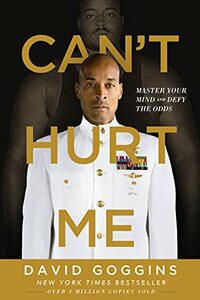Take a photo of a barcode or cover
adventurous
challenging
emotional
hopeful
informative
reflective
slow-paced
This book was more than I could have asked or hoped for. I thought it was just going to be a memoir of Goggins' life, but it was more. It was a deep dive into the mind, and the power of one's own brain. I listen to it on audio as well, and it was an audiobook/podcast/interview; after each chapter there was a podcast type interview with Goggins where he would surmise what was read, and provide a little more detailed information. He also presented challenges to help yourself become the better version of yourself. It was an awesome read, and is highly recommended.
adventurous
dark
emotional
hopeful
inspiring
reflective
medium-paced
inspiring
reflective
tense
fast-paced
adventurous
challenging
emotional
hopeful
inspiring
reflective
medium-paced
challenging
inspiring
reflective
fast-paced
inspiring
medium-paced
Real rating: 2.5/5
I picked up Can’t Hurt Me because I used to admire David Goggins and expected an inspirational story that might push me to attempt what I never thought possible. That was only partially the case.
While the book has undeniably motivational moments —especially when it comes to mental toughness and pushing through pain — it otherwise feels overwhelmingly self-congratulatory. Rather than reading like a reflective memoir, it comes across more as a running list of Goggins’s accomplishments, without much humility.
Some stories, like running 100+ mile ultramarathons on broken legs or feet, lack credibility. Especially when compared to the ending story that, somehow, he couldn’t finish his 2x pull-up world record attempt because of torn skin or an unbolted pull-up bar. The lack of balance makes the narrative feel less authentic and more like a legend being built in real time. In fact, he makes sure to mention a few times that today’s service members still continue to talk about his accomplishments as if they are in fact “urban legends” (yes, that’s a direct quote).
Another major issue for me is Goggins’s priorities: he repeatedly puts his own achievements above family, relationships, and faith. Rather than grappling with these choices, he glorifies them and almost even encourages readers to do the same. To me, there’s nothing noble in sacrificing those closest to you to chase selfish feats.
Finally, the afterword was particularly off-putting. Goggins claims his biggest motivation is that God knows everything — yet says his goal is to “surprise God” by achieving more than God believes he could’ve. From a Christian perspective, this is not only theologically flawed (God is all-knowing) but borders on blasphemous. It reflects an ego so large it can’t even leave room for genuine humility before God. Ridiculous.
Overall, while the book has motivational value, I’m concerned Goggins’s example could influence readers — especially men — in the wrong direction. Discipline and toughness are admirable, but not when pursued at the expense of faith, family, and meaningful relationships. In the end, Can’t Hurt Me shows what’s possible physically and mentally, but it also left me questioning what really matters most in life — and whether Goggins himself truly understands that.
Never meet your heroes (or read their books).
I picked up Can’t Hurt Me because I used to admire David Goggins and expected an inspirational story that might push me to attempt what I never thought possible. That was only partially the case.
While the book has undeniably motivational moments —especially when it comes to mental toughness and pushing through pain — it otherwise feels overwhelmingly self-congratulatory. Rather than reading like a reflective memoir, it comes across more as a running list of Goggins’s accomplishments, without much humility.
Some stories, like running 100+ mile ultramarathons on broken legs or feet, lack credibility. Especially when compared to the ending story that, somehow, he couldn’t finish his 2x pull-up world record attempt because of torn skin or an unbolted pull-up bar. The lack of balance makes the narrative feel less authentic and more like a legend being built in real time. In fact, he makes sure to mention a few times that today’s service members still continue to talk about his accomplishments as if they are in fact “urban legends” (yes, that’s a direct quote).
Another major issue for me is Goggins’s priorities: he repeatedly puts his own achievements above family, relationships, and faith. Rather than grappling with these choices, he glorifies them and almost even encourages readers to do the same. To me, there’s nothing noble in sacrificing those closest to you to chase selfish feats.
Finally, the afterword was particularly off-putting. Goggins claims his biggest motivation is that God knows everything — yet says his goal is to “surprise God” by achieving more than God believes he could’ve. From a Christian perspective, this is not only theologically flawed (God is all-knowing) but borders on blasphemous. It reflects an ego so large it can’t even leave room for genuine humility before God. Ridiculous.
Overall, while the book has motivational value, I’m concerned Goggins’s example could influence readers — especially men — in the wrong direction. Discipline and toughness are admirable, but not when pursued at the expense of faith, family, and meaningful relationships. In the end, Can’t Hurt Me shows what’s possible physically and mentally, but it also left me questioning what really matters most in life — and whether Goggins himself truly understands that.
Never meet your heroes (or read their books).
funny
informative
inspiring





